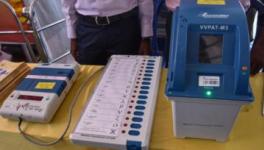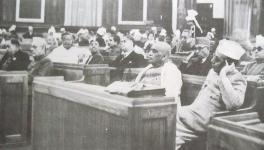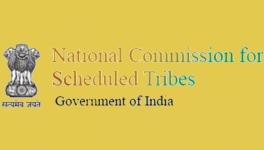FRA Case: Ray of Hope for Forest Dwellers, as SC Admits Intervention Applications
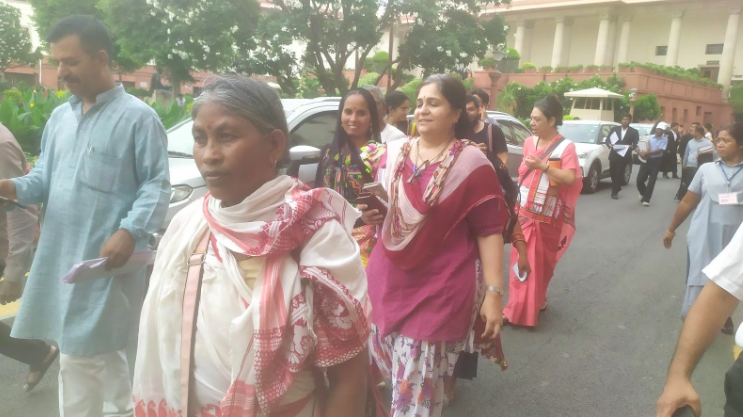
Some of the petitioners in the Supreme Court premises on Thursday.
New Delhi: The Supreme Court in its latest hearing in the case of the rejection of over a million tribal claims for their land, has stated that action is required against “urban encroachers” on forest land. The three-judge bench, consisting of Justices Arun Mishra, Navin Sinha and MR Shah, made these remarks at the conclusion of the hearing on Thursday, September 12, which lasted over half an hour.
In a significant development in the case, the bench also admitted all the Intervention Applications (IA) submitted to it. These included 15 IAs from tribal organisations and social activists among others.
The court also impeded the Forest Survey of India or FSI, as it admitted that it will take over 16 years to conduct a digital survey of forest land and produce satellite imagery to determine the extent of “encroachment” that has happened on the forest land.
Final arguments in the case are now scheduled to be heard November 26 onwards, with FSI also being made a party to the case.
Speaking with NewsClick, tribal activist Sukalo Gond said: “This is a big day for us, we had travelled all the way to participate in the hearing. We are now hopeful that our efforts on the ground will be recognised and our struggle will yield benefits.”
Roma of the All India Union of Forest Working People, (AIUFWP) said: “The weight of the petition of the Wildlife First Foundation has clearly reduced after today’s hearing and I feel that the appeal of the independent activists who were seeking to become a party to the case, has strengthened. At the end of the hearing, the foundation was pleading that the tribals are destroying forest land, to which the court responded by saying that there are hotels in the jungles which are destroying the forest land. So, the hearing has ended on a good note as the focus of the case has shifted to the constitutional validity of FRA.”
The Supreme Court in February had ordered the eviction of over a million tribals over the rejection of their claims to forest land under the Forest Rights Act (FRA). The order was passed by a three-judge bench comprising Justices Navin Sinha, Arun Mishra, and Indira Banerjee. The order, made public on February 20, directed state governments to ensure eviction of around 11 lakh people from forest areas spread across 17 states, latest by July 27.
In an effort to control the damage done by the order, the central government had filed a plea before the apex court seeking a modification, following which the Supreme Court put a stay on the order on February 28, permitting states to temporarily withhold the eviction of tribal families and investigate claims. In multiple cases, states have reportedly rejected the claims without proper investigation.
The court has now sent a notice to the Union of India and states to respond on the question of utilisation of CAF (compensatory afforestation fund) money and the review of the rejected claims. Earlier, Newsclick reported that eight states -- Assam, Bihar, Chhattisgarh. Jharkhand, Karnataka, Maharashtra, Tamil Nadu and Uttarakhand -- have told the Supreme Court in their affidavits that due process was followed in the investigation of the FRA claims. About 25 states and Union territories have so far filed their affidavits in response to the SC direction. Eleven of these states have undertaken review of the rejected claims. At least 10 states have also asked for an extension to complete the review process of FRA claims.
The writ petitions in the case have been filed by an NGO, Wildlife First, and some independent former forest officials. The petition was filed in 2008, and initially the case had three main petitioners -- The Bombay Natural History Society, Wildlife First and Wildlife Trust of India.
In a significant move, the Wildlife Trust has now appealed for withdrawal from the case over unspecified reasons, making Wildlife First the key petitioner arguing that tribals, whose claims under the Forest Rights Act of 2006 have been rejected, must be evicted from forest land. The petition has faced stiff opposition on the ground and has been met with regular protests and political opposition from political parties, such as the Communist Party of India Marxist (CPIM) and the Congress.
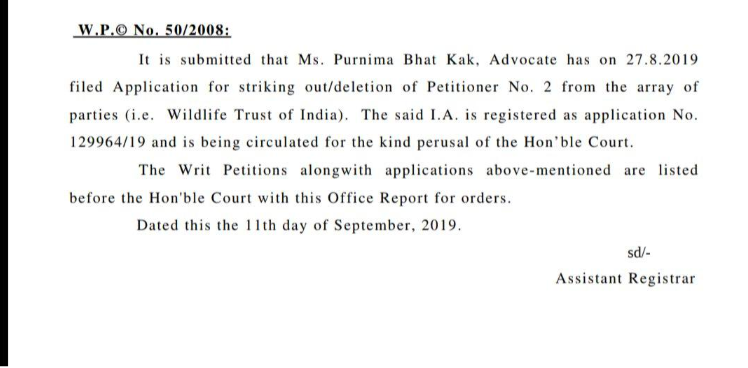
Speaking of the future course of action, activist Teesta Setalvad said: “This is a big day for us as all the intervention applications have now been accepted. We will be building a momentum on the ground to fight to save the Forest Rights Act which was given to us after a long drawn struggle with the Indian State to recognise the rights of adivasis and forest dwelling communities and to correct the historical injustice done to them.” She also announced the possibility of a rally ahead of the next hearing in November.
Get the latest reports & analysis with people's perspective on Protests, movements & deep analytical videos, discussions of the current affairs in your Telegram app. Subscribe to NewsClick's Telegram channel & get Real-Time updates on stories, as they get published on our website.









